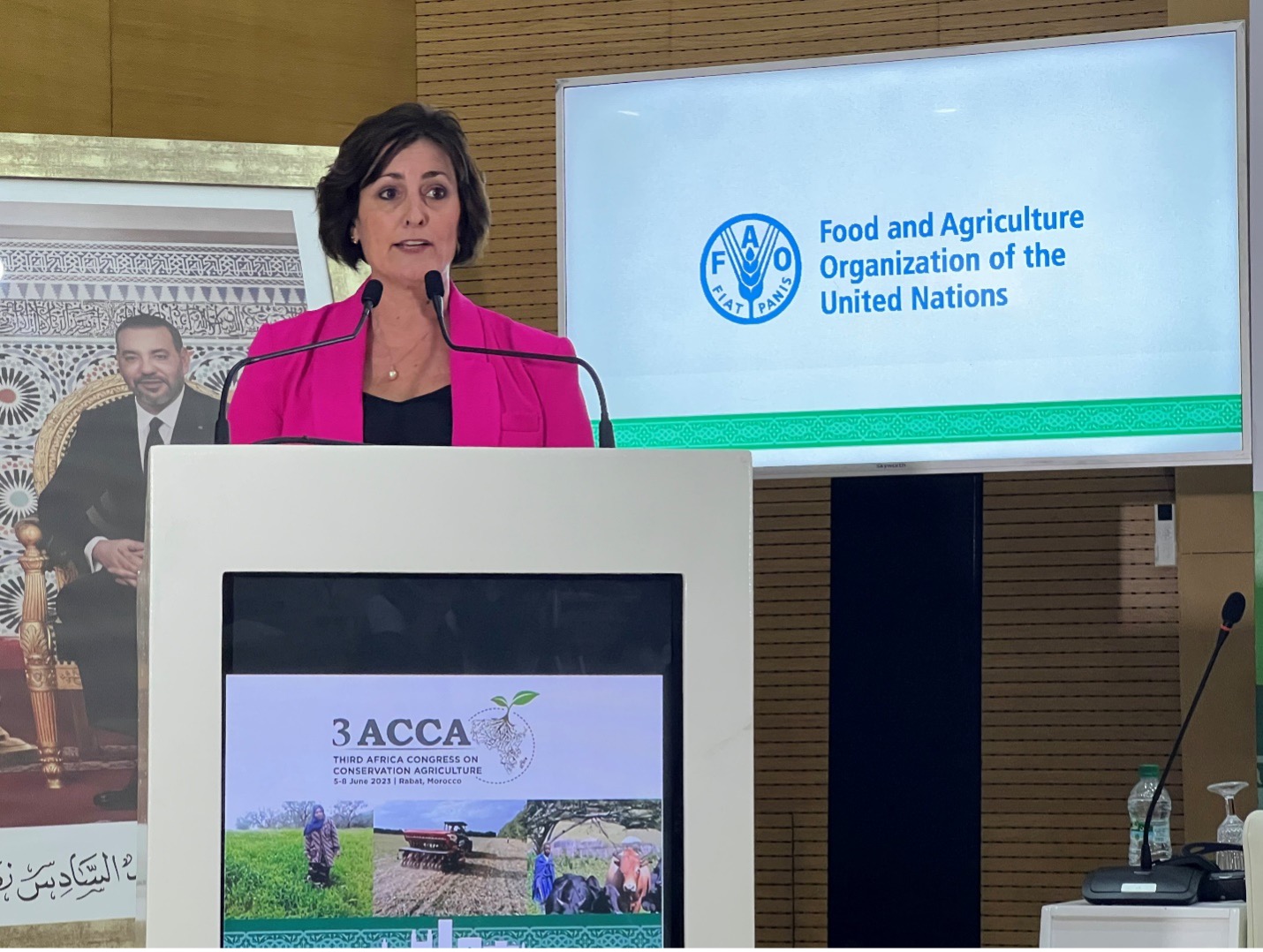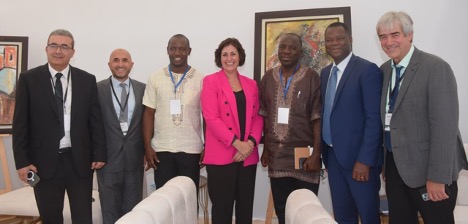Third Africa Congress on Conservation Agriculture held in Rabat under the banner of "Building a Resilient Future in Africa through Conservation Agriculture and Sustainable Mechanization"
FAO DDG Bechdol urges the Third Africa Congress on Conservation Agriculture to work together to reap the benefits of combined development of Conservation Agriculture and Sustainable Mechanization in Africa.

Participants of the Third Africa Congress on Conservation Agriculture
©FAO
Rabat, Morocco, 05 June 2023 – The Third Africa Congress on Conservation Agriculture (3ACCA) took place from 5 to 8 June with the aim to foster awareness and interest in the uptake and spread of conservation agriculture and sustainable mechanization in Africa. Over 550 participants attended in person, from 63 countries which including 32 African countries, to share updates, lessons learnt and the latest developments in these fields. 3ACCA was jointly organized by the African Conservation Tillage Network (ACT), the Ministry of Agriculture of the Kingdom of Morocco, the African Union, the Food and Agricultural Organization of the UN (FAO), the Institut National de la Recherche Agronomique (INRA) of Morocco and the CGIAR International Center for Agricultural Research in the Dry Areas (ICARDA).
 |
FAO Deputy Director-General Beth Bechdol giving her inaugural speech to the Congress. |
The two-day Congress was opened by FAO Deputy Director-General Beth Bechdol who said she was pleased to see so many participants and encouraged them to help turn challenges of climate crisis, lack of access to markets and mechanization, and gender inequality in agrifood systems into opportunities.
Bechdol affirmed that, on the one hand, Conservation Agriculture (whether in the form of crop rotation, soil cover, or reduced and no-till practices) can bring economic, agronomic and environmental benefits by giving us the potential to prevent losses of arable land while regenerating degraded lands. On the other hand, Sustainable Mechanization (including precision agriculture technologies, conservation tillage equipment, and irrigation systems, among others) offers opportunities to improve productivity, reduce drudgery, and enhance efficiency in farming operations.
“The ‘magic’ happens when Conservation Agriculture and Sustainable Mechanization are put together” Bechdol advocated this combination can “enable us to build a resilient future for African Agriculture, especially for women and youth." She recalled the collective goals towards meaningful and scaled-up investments in agriculture that are included in the 2014 Malabo Declaration on Accelerated Agricultural Growth and Transformation for Shared Prosperity and Improved Livelihoods; the UN Sustainable Development Goals; and the African Union's Agenda 2063.
Bechdol reiterated that all stakeholders must be involved to achieve these goals; governments and the private sector each have contributions to make. To that end, she conveyed that “FAO is committed to helping its Members achieve impact at scale by bringing our major strengths to bear on agrifood investments, including our normative work, technical expertise, data, convening power, partnerships, and extensive country presence”. Encouraging partnerships are already underway, for instance, FAO and the African Union's joint Sustainable Agricultural Mechanization: A Framework for Africa (F-SAMA), reflecting African priorities, needs and aspirations developed by African stakeholders. Furthermore, FAO has been working closely with the ACT since it was created in 2006.
 |
DDG Bechdol with Hafiz Muminjanov and Josef Kienzle of the FAO Plant Production and Protection Division, with colleagues from FAO Zambia. |
Bechdol ushered in the 3ACCA program, which had the participation and facilitation of various members of the FAO Plant Production and Protection Division (NSP), by citing a wider context of relevant concrete actions that FAO is supporting: modernizing and digitalizing FAO's longstanding Farmer Field School programme; soil map development tools available for Members to better understand the effects of climate change; and partnering with the AU on a US-led initiative “the Vision for Adapted Crops and Soils”. She invited all 3ACCA attendants to participate at the first-ever Global Conference on Sustainable Agricultural Mechanization taking place at the FAO headquarters from 27 to 29 September.
